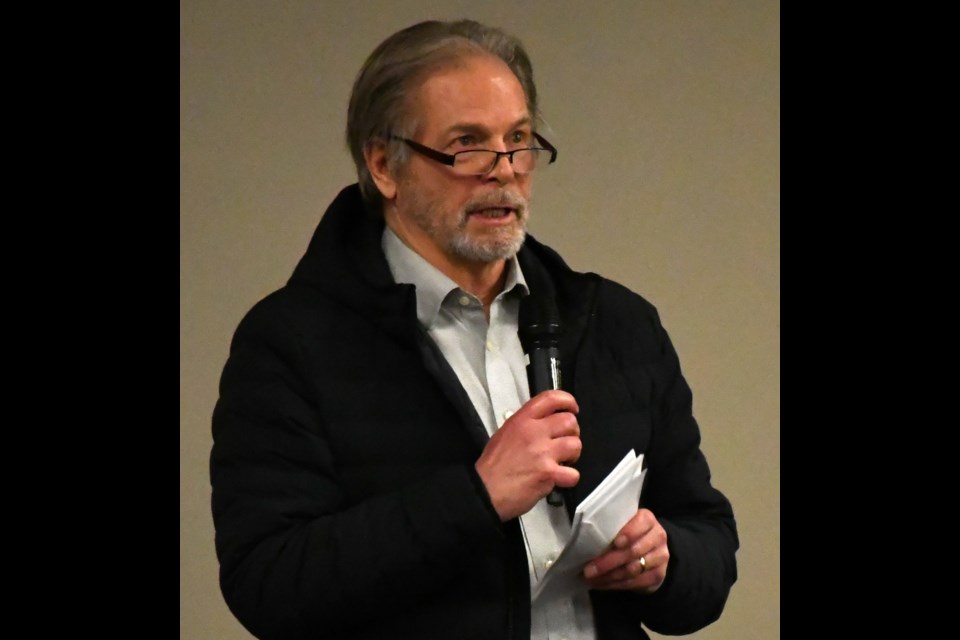Brian Swanson spent 24 years as a city councillor and received many reports about the landfill, including information about the provincial government letting Moose Jaw expand its current venue eastward.
Swanson used that knowledge in his presentation at the Events Centre on March 19, during the public hearing the Rural Municipality of Moose Jaw held about the City of Moose Jaw’s proposed solid waste management venue project application.
The RM council faces a tough decision considering the city has already completed 98 per cent of this process, he said. Although rural councillors may not feel good about voting on this, he thought they could pursue another option.
After being re-elected in 2003, Swanson remembered city administration saying the landfill had about two years remaining. Eleven years later, he was at a council planning session when the topic — a contentious issue across the province — again arose. Swanson asked administration for the consultant’s engineering report since this discussion had occurred for roughly three years.
He admitted that he never felt satisfied with the answers he received about the landfill. Furthermore, he thought his job was to critically analyze what information he was receiving, what he wasn’t receiving, when he was receiving it and why he was receiving it.
One option city hall that has deemed impossible but that has existed for years is to expand the landfill east on city-owned lands, Swanson said.
Since landfill design has requirements that include liners and leachate control measures, the principles guiding the development of the new site can be applied to the existing location, he added. He wanted an engineering firm to create a report saying how the expansion could be made environmentally compliant.
When Swanson retired in 2020, he threw out an inches-thick stack of reports about the landfill, a decision he regrets.
“(Those reports) consistently stated that … there was going to be expansion to the east, and the government was aware of this and had kind of agreed to it,” he said.
While the clay at the existing location may be insufficient, the city could bring in new material and install liners during the expansion, Swanson continued.
Furthermore, the cost would likely be comparable to the $6 million that city hall is paying for the 390 acres. Also, the city wouldn’t have to construct new infrastructure since the weigh scales and compactor are already present.
Swanson said he didn’t believe city administration’s claim that a new landfill would be less expensive over its 100-year lifespan than an expansion, which would last only a few decades. Further, none of the forum attendees would be alive in 40 years to verify those claims.
“And statements like that, I take with a grain of salt,” Swanson said. “(Furthermore), I always felt there was (a hidden) agenda with the landfill. And it’s my belief that … the city sees the landfill as a big money-maker.”
City administration has twice taken funds from the solid waste utility — a standalone account responsible for its own revenues and expenses — in the past few years to offset capital or operational expenses, he continued. To him, those boundaries “become very fuzzy when necessary.”
With the current landfill sometimes taking in nearly three times as much area refuse as expected, the future dump could also be a money-maker, he added.
The city annexed RM land years ago to build the agri-food industrial park, with officials saying they would not spend one penny there until they sold lots, Swanson said. Seven years later, the city has invested millions and sold zero lots; SaskPower’s Great Plains Power Station is not part of the park since it’s an independent greenfield project.
“When city hall gets ideas about how much money they’re going to make from things, I have reservations,” he stated.
While rural residents fear the city could annex or expropriate “the best farmland in the world” if the application fails, Swanson said annexation “takes two” willing partners, while he doubted the province would support expropriation.
Swanson added that the City of Moose Jaw “makes really bad land deals” — prompting the crowd to laugh — and cautioned the RM council about entering into a similar agreement.




